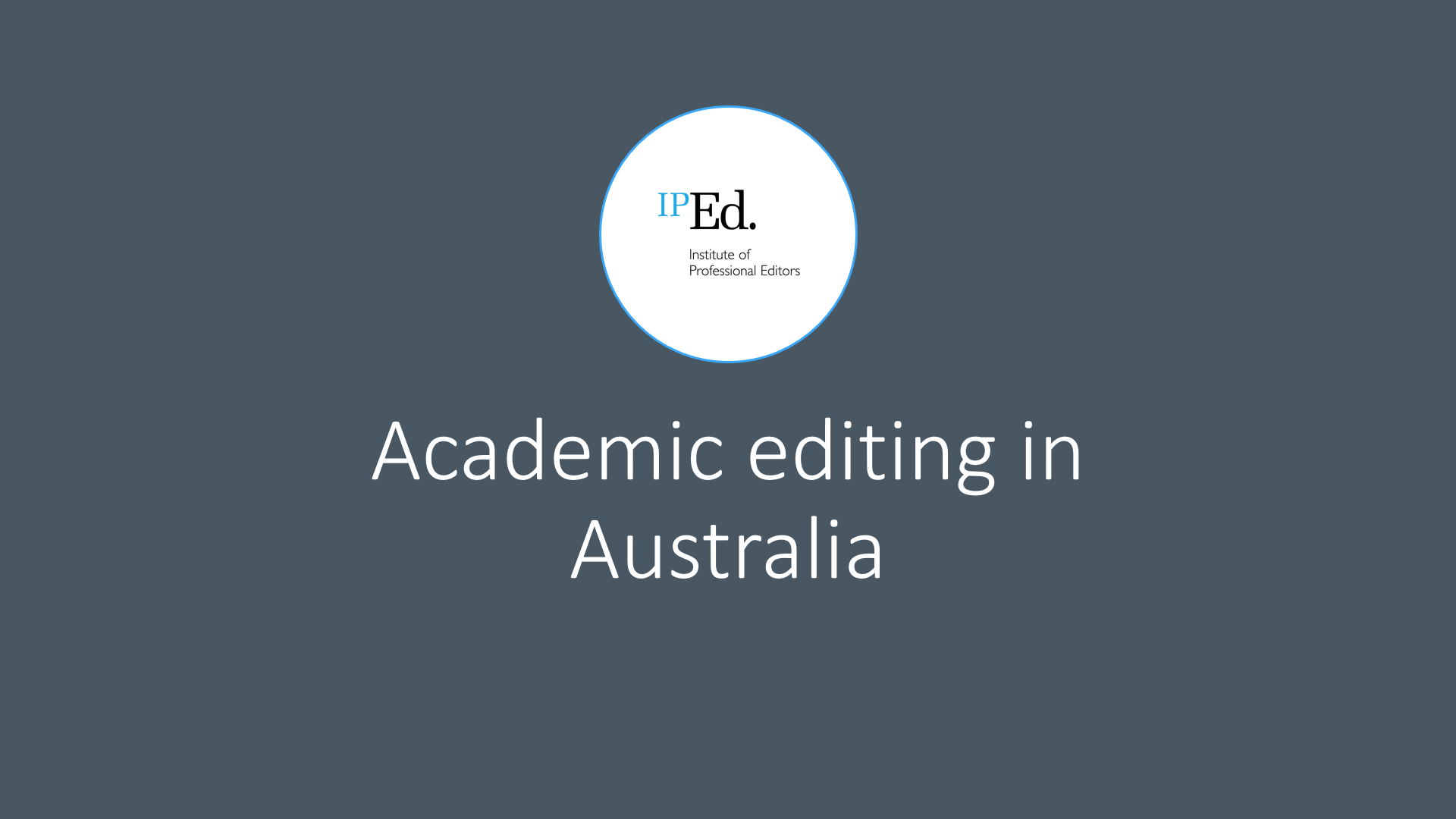
Thanks to Zoom, our January UniSIG speaker Hazel Baker was able to join us on a cold winter morning from Sydney, Australia, where it was a hot summer evening. Over 20 of us – including a couple of guests from the UK and South Africa – logged in on 15 January to hear her talk on ‘Academic editing in the Australian context’.
Hazel set the scene by giving a quick overview of IPEd, the professional association for Australian and New Zealand editors. Its 1,200 or so members are bound not only by its Constitution but also by its Code of Ethics. If they wish, they may apply for accreditation, which entails passing a stringent three-hour exam based on IPEd’s Australian standards for editing practice and then renewing their accreditation every five years. Like SENSE, IPEd has a directory of editors that can be used to search for editors with specific subject expertise and language skills.
Moving on to describe the academic context, Hazel pointed out that 25% of the students at Australia’s 43 universities are international, with Chinese accounting for the largest group, followed by students from India, Nepal, Brazil and Vietnam. A new edition of IPEd’s Guidelines for editing research theses was published in 2019. As well as explaining the copyediting and proofreading tasks involved in editing master’s or PhD theses, the guidelines also detail the responsibilities of supervisors and students.
It was no surprise to hear that in Australia, the cost of editing a thesis depends on the time needed, which in turn depends on factors such as number of words, complexity and quality of the language. Hazel noted that an Australian university will typically contribute about AUD 800 for editing a thesis; that’s equivalent to only about EUR 536! She did add that in practice, costs were higher.
Some of the aspects Hazel highlighted were familiar to us here in the Netherlands. They included the techniques of editing (tracking changes and using marginal comments), the ways editing can help academic researchers, who does the editing (salaried editors, freelance editors, editors working for companies providing editing services) and the range of documents they deal with, but there were differences. For example, under IPEd’s guidelines, students should show their editor their supervisor’s written approval to use an editor, and the version of the thesis the editor receives to work on must have been approved by the supervisor (‘signed off’) for editing. The guidelines clearly state what is meant by copyediting and what is meant by proofreading; from the discussion following Hazel’s talk it was clear that in Europe, the distinction is generally not so clear-cut and that in the UK in particular, ‘proofreading’ can cover a range of textual interventions, some of which are major. SENSE member Stephen Machon, however, did point out that faculties of law at Dutch universities take care to specify that editors of theses by law students may amend language but not content and that this process of amending language only is generally termed proofreading and not editing.
In response to a query about acknowledging editors’ input (which the guidelines advocate), Hazel noted that IPEd has suggested wordings available but that some universities require their suggested wording be followed.
This informative and lively 90-minute meeting demonstrated the added value of using Zoom to link up with colleagues from around the world to gain insights into other approaches and contexts of editing. There will be more opportunities for international linkups in forthcoming meetings!

On 6 November 2020, SENSE organized REFOCUS • REBOUND • REPEAT: a free panel discussion on risk-taking and agility for freelancers in turbulent times. The panel consisted of four founders of international, creative-industry companies, and was moderated by SENSE CPD Coordinator Matthew Curlewis. Longtime SENSE members Carla Bakkum and Francis Cox share their respective takes on the event.
Carla Bakkum:
I had signed up for the REFOCUS – REBOUND – REPEAT panel early on, drawn by the prospect of fresh voices from outside our regular circles. And I was not disappointed with the panel that our CPD Coordinator Matthew Curlewis expertly put together and hosted: the geographical range – from here to down under and back – was spectacular, and the varieties of English were a joy to hear.
David Beckett, the nestor of the group, related how he reinvented himself in the 2009 crisis after a losing his big-company job – an inspiring lesson in soul-searching and discovering your true talents. Industry influencer Kerry Finch highlighted the shift toward stakeholder capitalism among the big brands she advises. Amsterdam-based recruiter and consultant Mariette Hoitink described the ecosystem of young talents she works with and their take on life: keen to create, experience and take care of the world and each other, while less focused on financial success (a great example for older generations, I would say.) Valerie Khoo reported that writers in her country were bearing up pretty well in the current circumstances, while also reminding us that there’s a world beyond Covid-19 – it already exists in Australia!
Over 100 participants tuned in, all of whom could post questions and add comments. I saw lots of familiar names come by. It saddened me a bit that I couldn’t share a drink with them after the event, but on the whole, I came out of the session feeling genuinely uplifted.
Francis Cox:
The word 'inspiring' is overused, particularly in the copywriting game, but it fits the SENSE panel discussion REFOCUS - REBOUND - REPEAT. I was worried at first that it was going to be too corporate-speaky (‘Amplifying a thought leadership position’? Spare us!), but it soon got down to brass tacks. As someone who's reinvented himself several times over the years, a lot of the strategies mentioned were familiar to me. I'm a strong believer in making small improvements and changes in order to reach a bigger goal. That's how I moved to the Netherlands. I particularly liked Valerie Khoo's comment that there are a lot more opportunities out there for professional growth and change than you might think. That's certainly been my experience.
I had a problem, though, with the idea of pivoting or doing a 180. It sounds too drastic. I've been a video technician, fundraiser, translator, copywriter and actor. For me, there's been a logical progression to that career path since all those jobs relate to communication. One strategy I would add to those covered in the discussion is: Listen to the signals you get from your network or the universe in general. That's how I became an actor. More recently, people have been telling me I have a great voice. Because of that, I've been developing myself as a voice actor throughout the last lockdown. By constantly growing and changing in this way, I feel able to face whatever life throws at me.
What other attendees said:
“Outstanding, thank you all!”
“Very interesting, a good combination of panellists.”
“Inspiring discussion, thanks to SENSE and speakers!”
“Really useful and enjoyable.”
“Plenty of food for thought.”
The panel discussion recording is available upon request until 28 February 2021. Please contact the Web Manager if you are interested in viewing it.

The Starters SIG meeting on 7 December 2020 was an enjoyable session packed with useful information about personal branding for freelancers. Graphic designer and identity branding expert Sarah Notley discussed using social media, getting started with email marketing and the essentials of website design. She started her presentation with the thought-provoking statement that ‘Personal branding is the story people tell about you when you're not in the room.’ Having caught everyone's attention, she went on to talk about the tools you can use to communicate your brand (your visual identity, your website etc.), where to look for your target audience and how to reach them (don't put all your eggs in one basket), setting goals and ways of measuring success, choosing brand assets and making them work for you (without having to invest more time and effort than you can afford) and effective marketing strategies. She also discussed the basic principles of search engine optimisation (SEO) and strategies to make sure that your website fulfils Google's preferences for ranking websites in response to users' search queries.
Besides providing a wealth of practical information and tips, Sarah also looked at the current websites of two brave volunteers. She then provided them with constructive feedback and suggestions for improvements. This was an extremely useful exercise (as well as an opportunity to see fellow translators' websites), since it provided attendees with practical examples of the elements she’d covered in her presentation. Maaike Leenders, one of the volunteers, had this to say about the experience:
‘I’d been thinking about redoing my website for a while and was struggling with the same questions over and over again: Where to start? What am I doing right and what can be improved? Should I do it all myself or get some help? So when the call came for volunteers to show their website to a brand identity specialist, I knew I had to get out of my comfort zone and sign up.
Sarah made it a very practical and pleasant experience. After talking to us about building a brand and the important elements of your (online) presence, it was time to look at the volunteers’ websites. I can’t deny I was a bit nervous about having everyone take a look at the same time! However, the positive feedback I received and Sarah’s presentation really clarified what I could tackle first – and how. This was exactly what I was looking for, and I’ve got my plan for a 2021 website revamp ready to go!’
The meeting ended with a Q&A session during which Sarah answered participants' questions and provided yet more information, suggestions and prompts.
Although I've been a freelance translator for quite some time, I've only recently started marketing myself and my 'brand'. A website is top of my list, so this session was just what I needed!

The importance of revision will be self-evident to SENSE members. It’s easy to overlook a mistake when you’re juggling two different languages, or editing copy or publications. So how do you revise effectively? Fortunately, Brian Mossop is a respected authority on revision and answered this question, among many others, during his two-part workshop. Because of the pandemic, Brian could not join us as planned at the 2020 Jubilee conference, but thanks to the marvels of technology, Brian could tell us more about revising without leaving the comforts of his home in Canada.
The first part of the workshop focused on revision in general and self-revision in particular. On the solid basis of academic research and forty years of experience, Brian shared his thoughts on revision, translation quality and the principles of making changes. He argued, for example, that revision should be primarily considered a reading exercise and not a writing exercise. Revisers should ask themselves if they really need to make a change, not whether they can think of a better translation. Furthermore, having a clear definition of ‘quality’ or ‘fit for purpose’ in mind can help you work more objectively, more justifiably and possibly even more quickly.
Rethinking what revision is and is not proved to be a valuable exercise in itself, but the workshop also included many hands-on exercises to put those new insights into practice. During one exercise, attendees identified which translation strategy comes naturally to them. If you know that you tend to start revising mid-translation or that you don’t look back before your first draft is done, you can adapt your revision strategy accordingly.
Attendees also had the opportunity to discuss their revision experiences and share their own best practices. One helpful tip was to revise ‘backwards’, that is to say, from the last sentence of the translation back to the first one. A few attendees reported this helps them when revising in a rush.
The second part of the workshop addressed, among other things, revising the translations of others. How do you check all possible aspects of a translation systematically? How much do you actually need to revise to assure quality? And how do you maintain a good working relationship between the revisor and the revisee, which can be the trickiest part of revision? One great tip was not to make changes you can’t justify, as well as remembering this is not your translation. If it is a good translation, it is perfectly justifiable to make no changes at all.
The workshop was quite intense, offering attendees many new insights as well as actionable best practices they could start applying right away. For instance, Brian recommended reading the translation before turning to the source text, which worked out surprisingly well for me personally.
If you would like to improve your revision skills, the fourth edition of Brian’s book, Revising and Editing for Translators, is now available.
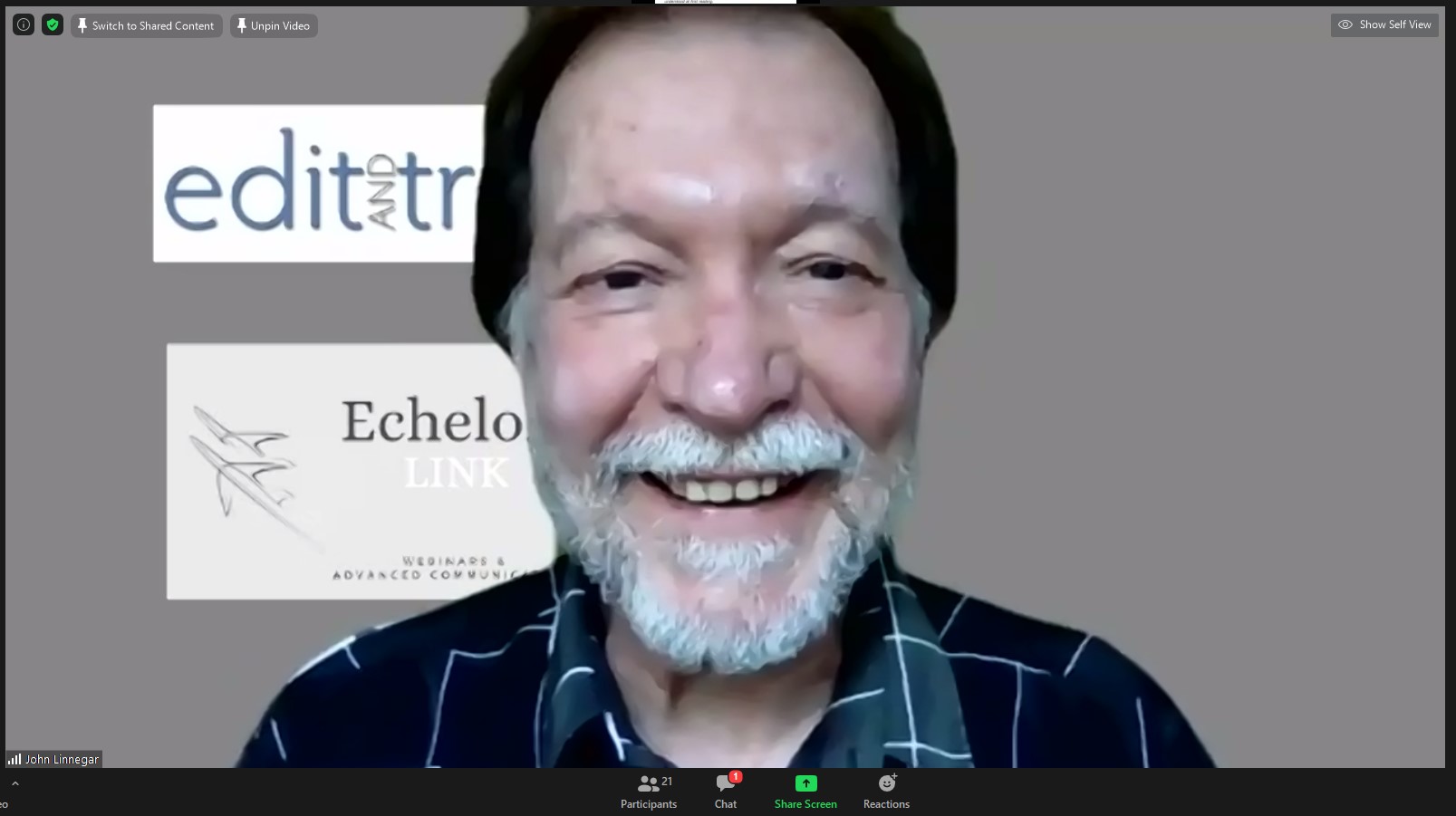
Anyone familiar with John Linnegar’s erudition on all things English grammar and editing will not be surprised to hear that his contribution to this year’s SENSE Jubilee 2020 workshop series, ‘Applying plain language principles to creating accessible, reader-friendly texts’, was highly anticipated and well attended. The four-hour workshop on a Thursday afternoon in November was just the thing to wake us all from our social distancing slumber and get us thinking deeply about the tools of our linguistic trade. A former teacher of English in secondary and higher education, John has been a copy editor, trainer, and publisher for over 40 years. He is the co-author of many articles and books on English grammar, editing, and language, among them Oxford English Grammar: The Advanced Guide, Text Editing: A Handbook for Students and Practitioners, and two volumes on text editing in two of South Africa’s indigenous languages: Sesotho and IsiZulu. He has served on the board of the Dictionary of South African English and as the chair of South Africa’s Professional Editors’ Guild (PEG) and is the current SENSE Member-at-Large. With 20 participants hailing from several countries across Europe and John joining us from his Zoom office in Cape Town, it was a truly cross-cultural and multi-lingual affair.
John is passionate about the plain language movement but applies its insights with a delicate touch. He cites the philosophy in a concise adage: ‘The message is important, not the fancy language wrapped around it’. The assumption here is that however complex or nuanced the author’s intended message, it can be communicated to readers in a straightforward style. If the text is too wordy or the sentence structure too baroquely complex for the intended reader to grasp ‘at first reading’, the task in revising should be to shear it of excess and allow the essential communiqué at its core to shine through. This promotion of the reader’s perspective and expectations will be familiar to any editor or language professional, as will the attention to intended audience, genre and discipline. But what of the author’s perspective in all this? Can or should the author’s voice and ‘insider’ discourse community find equal weight in our work?
While John exhorted us to ‘dress language down’ where appropriate and when possible, we were advised not to ‘dumb the author’s ideas down’ nor reduce the style to bland pap. ‘It is comforting to find’, John noted during discussion, ‘that we don’t have to dress down style’. It is this latter caveat against reductionism that gives John’s workshops and presentations such relevance to academic writers and editors. It avoids the trap many rule-based writing advice gurus fall into of alienating those of us who are moved by academic writing’s many inspiring functions and forms. While the purpose of some texts may be to broadcast a message to a wide audience, others are written with smaller communities in mind in the hopes of breaking new expressive ground, forwarding paradigm-shattering insights, highlighting marginalized voices, creating new theory, or dislodging its readers if only a little from their stock categories and patterns of thought. Plain and simple declamation is not always appropriate. Nor is it even always desirable.
Plain language has a place – an important one – to be sure. The movement’s democratic commitment to enfranchising those who have been historically disadvantaged by gatekeeping language is inspiring and long overdue. But like every stylistic choice, its usefulness is context-specific. When generalized to all writing forms and all writing communities, a censure against unplain style actually works against the democratic principles that are the movement’s prime motivation. In my preferred linguistic world, there is also a big place for the subversion of reader expectations. The rub, of course, is that to do that, you first have to know what those are and how to meet them. That’s where plain language comes in strongest.
Used descriptively and not prescriptively, plain language techniques offer writers and editors a valuable set of targeted skills we can have at our ready. Whether we’re looking to recast garbled draft sentences into clear and concise versions, spice up otherwise wooden texts, or craft a voice and style that is wholly outside the box, learning how to recast and move things around in a sentence can widen the range of textual effects we are able to produce. Splitting and reconnecting, shortening and reordering, substituting and recombining – all these devices can shake us loose from our linguistic grooves and expand the kinds and functions of sentences we use. As SENSE CPD Coordinator Matthew Curlewis taught us in his Writers' Stretch & Tone series, our writing becomes stale when we repeatedly fall back on turns of phrase, constructions and genres we know too well. Adopting new styles and voices can spice things up.
So while we may sometimes read, write or work with a perfectly good academic, literary or policy text that is all ‘dressed up’ with difficult words, jargon, nominalizations, noun strings, negative statements, subordinations and archaisms that are there for a purpose and not to be touched, dressing things down once in a while can enliven our writing, editing, and translating, if only by force of variety. If Oliver Lawrence’s insights on the many uses of sound in writing are to be believed, experimenting with and studying a wide variety of forms, styles, voices and linguistic strategies can make us all better writers and language professionals. Plain language is no exception and should form part, though certainly not the whole, of our study.
But just in case anyone missed my message here, I will not be straightjacketing my written or editorial voice to fit plain language style preferences any time soon. Unapologetically unplain is fit for purpose for the kind of editorial work I do and the discourse community I make my home in. Unless the tone threatens to undo the author’s ends, I consider voice to be out of bounds for my editorial intervention, even for non-native English speakers writing in English. My job as an editor is never to change the author’s voice but rather to help it come into its own through close reading and ‘deep hanging out’ with the text. I do that by offering my clients what Sally Burgess has recently called the ‘gamut of choices’ from punctuation to syntax, word choice to modes of expression, argumentation to rhetorical structure that together make up a writer’s voice. As University of Chicago Press copy editor Carol Fisher Saller argues, editors can take an adversarial or a cooperative approach to an author's choices, but not both. The editor must choose. Having been edited by John more than a few times, I can attest to his gentle editorial touch: he never outmaneuvers my voice, means of expression, or intended argument in favor of ideological cudgeling. He swims with not against the grain of the text he edits, a skill that sounds easier than it actually is. When wielded in his hands, plain language techniques become something of a marvel, making me wish I’d thought of that way of phrasing things in the first place.
I’ll therefore let the plain language presciptivists wave their ideological banners on their own and take on board instead what John’s gentler, more democratic approach has given me: some very valuable writing techniques I can pull out whenever I choose – choice being the operative word. I don’t actually believe, after all, that the sole function of language is to broadcast a message or instrumentally impart information to an uncooperative reader. My faith in the reader’s agility, the generative value of linguistic oddities, and the ‘pushmi-pullyu’ of bringing multiple styles and voices into conversation may be naïve or even utopian and silly, but I wouldn’t part with it for all the world.
Theresa Truax-Gischler is a developmental and substantive editor in the narrative social sciences and humanities and has served on the SENSE EC. In early 2021, she and long-time SENSE member Maria
Sherwood-Smith will give a MET workshop on editing humanities and social science texts.
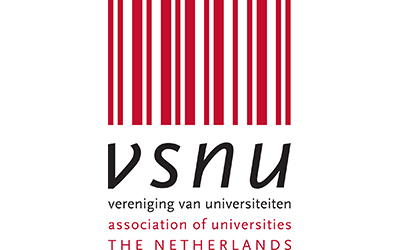
At the latest online UniSIG meeting on 6 November, Mike Gould made a persuasive case for open access archiving. Open access publishing is a model in which published research is made freely available. Gold open access refers to publishing in an open access journal, where the publication can be accessed free of charge; another route is green open access, which refers to publishing in any journal and then self-archiving the publication, either in an online repository or on a website. It was this second route – archiving as opposed to publishing – which was the focus of the workshop.
The benefits of open-access archiving are numerous: research is available sooner and to a much broader audience; researchers can be more transparent about their findings; and in the long run, libraries may be able to redirect some of their funds from journal subscriptions to funding the peer review process itself. Luckily, in some scientific fields, open access publishing is also becoming the standard and seems set to become more popular in future.
Mike highlighted the interesting state of play in the Netherlands. The Association of Universities in the Netherlands now has an umbrella agreement with several large publishers, including Elsevier and Taylor & Francis. This agreement means that Netherlands-based researchers can publish in journals with full open access rights, free of charge. There are substantial advantages to the publishing author, which raises the question of whether authors’ editors should advocate for open access publishing. Mike’s advice is to consider what falls under your remit: if you have been hired as a communication consultant, then it’s worth advising your client to publish in an open access journal, or to self-archive in a digital repository.
Our follow-up discussion touched on a number of points, including the decreasing resistance to open access among PhD supervisors, the relative impact of journal articles and books in different disciplines, and whether subscription-based journals can continue to act as gatekeepers for quality control. As open access publishing becomes more prevalent, it will be interesting to see how the publishing industry responds, and whether our clients also become more receptive to the benefits of open access publishing and archiving.

The Southern SIG is finally back in action! On Tuesday 24 November, a good number of SENSE members from all over the Netherlands – and even slightly beyond – celebrated the grand return of the Southern SIG. After everyone introduced themselves, a friendly and informal conversation ensued on a myriad of subjects ranging from bookshops and Dunglish to retirement. As SIG convener, I was also delighted to receive many great ideas for future Southern SIG events.
We had some great tips for members who like to keep developing their skill sets. The College of Media and Publishing’s online copywriting course came highly recommended, as they allow you to study whenever you find the time. What’s more, they don’t just offer great courses, but also frequently provide discounts. Another good website to get smarter is Coursera, offering MOOCs (Massive Open Online Courses) from top universities on many different subjects. We even learned that some Erasmus University Rotterdam MOOCs were edited by fellow SENSE members. If you struggle at times to muster the self-discipline to study, you might like to join an accountability group: a group of students who regularly meet to report their progress to one another – or admit to the lack thereof.
Another challenge we discussed is to get your UK passport renewed before the infamous and carefully avoided ‘B word’. During Covid times, making a round trip to Albion is unfortunately not an option. Luckily, you can apply online, but the process is a bit quirky. Rather than informing you of the requirements upfront, the procedure tells you what to do as you go. Be prepared to take a picture with your very own smartphone, for instance.
In short, the event was a resounding success and very informative. Hopefully, the Southern SIG will be able to meet in person next year, offering local fruit pie (vlaai, for the connoisseurs) by popular request.
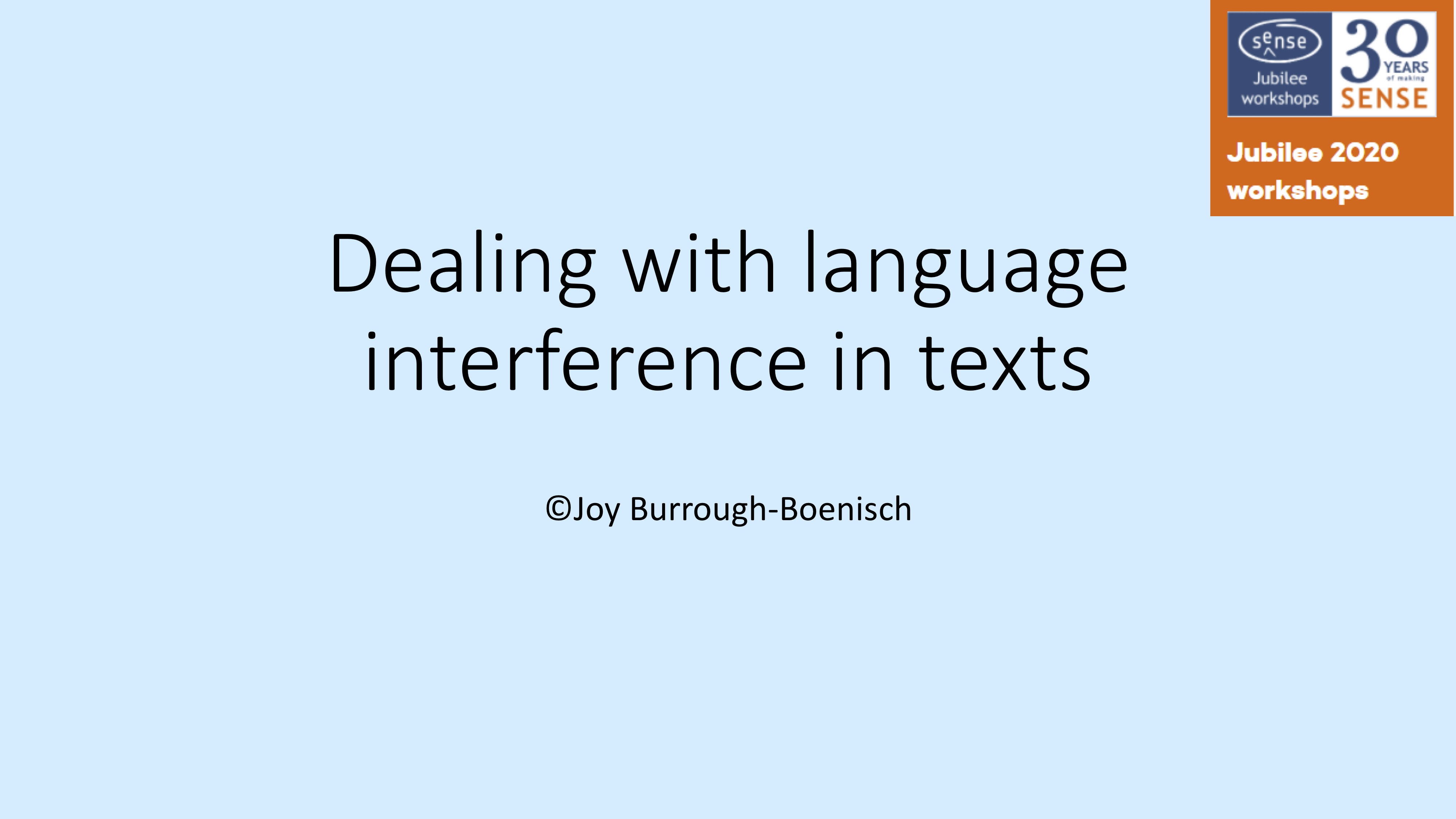
As the author of Righting English that’s gone Dutch and a PhD thesis on Culture and conventions: writing and reading Dutch scientific English, who better to talk about language interference than Joy Burrough-Boenisch?
Joy has worked as an authors’ editor and translator for Dutch academics and scientists for decades and has also taught academic writing to graduate students. To get an idea of the language backgrounds of the participants, she first asked us which languages we speak. Thanks to Zoom, there were attendees from seven countries, speaking nine languages between us: an impressive reservoir of linguistic knowledge that we could draw on! Besides the influence of Dutch, her specialism, Joy also reviewed examples of English influenced by other languages.
Joy presented the eight of us attending the workshop with numerous examples of language interference and we discussed how best to deal with each of them. It was, in fact, an advantage to have such a small group of attendees: there was plenty of interaction, and everyone had a chance to say something.
We looked at ‘false friends’ between various languages, had fun dissecting a Dunglish lunch menu and puzzled over examples of interference from various European and Asian languages. The concluding overview of some striking cases of bizarre language interference included ‘Kiss and Ride’ (instead of ‘Patient Drop Off’), ‘symptoms of flew’, ‘toilet disabled’, ‘bicycle shed library’ and ‘(un)sterile gloves’.
Joy had sent us two short texts to edit in advance, so we started the workshop discussing that homework assignment in pairs. Then we compared notes. After a break, we divided into small groups to work on two more exercises which we received on the day. A group approach to editing delivered effective rewriting of some very challenging texts.
Joy is a lively speaker, so this workshop was both informative and great fun. The take-home messages were that we shouldn’t interfere unnecessarily with the author’s ‘voice’, should always deal tactfully with clients, but should also be authoritative, quoting trusted sources to support our editing choices.
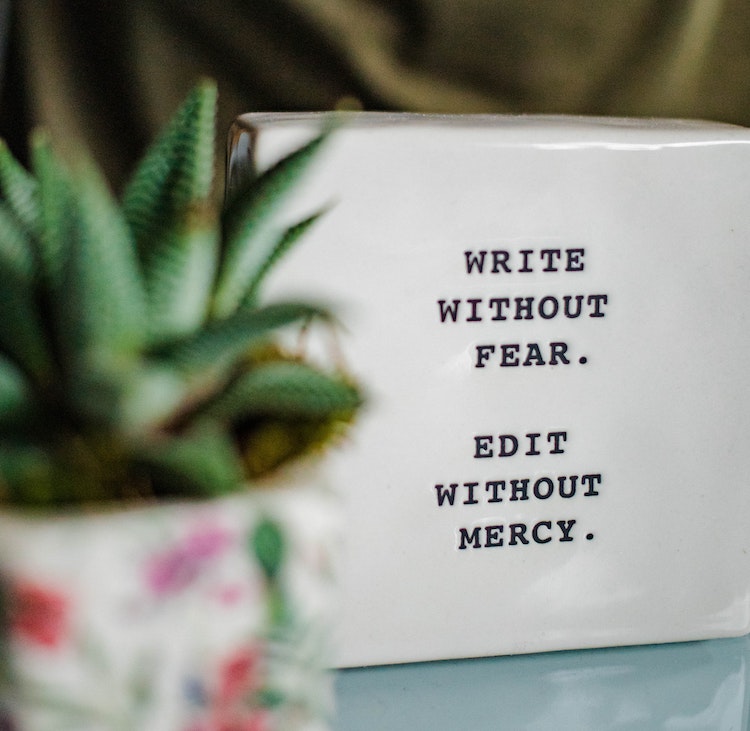
This wonderful six-week workshop series didn’t only get us writing about all sorts of things in styles we didn’t know we were capable of; it also makes us greedy for more. ‘Just write’, says facilitator Matthew Curlewis, and you do. The emphasis was definitely on actually writing, rather than merely talking about writing. There was a clear structure to the sessions and a clear line across the six weeks. All of this contributed towards creating a pleasant sense of being in good hands which, in turn, encouraged people to possibly step further outside of their comfort zone than they would have expected.
When friends asked me what the workshop entailed, I said, ‘Well, we write. We just write. And sometimes we read our writing aloud to the rest of the group and sometimes we listen.’ And you could see them thinking, ‘But how?’. After a brief introduction, Matthew got everyone to jump in at the deep end by giving us a choice of three situations to write about. We got roughly 15 minutes to write and then it was time to share. My two favourite themes were: ‘Think about a photo and start your writing with the phrase “In this one, you are …”’ and ‘Taking inspiration from a poem by George Ella Lyon, write a piece using the opening phrase “I am from…”’.
The pace was quite fast, with everyone writing at least three pieces in a session. During the reading aloud of the written pieces, I found myself moved, thrilled, saddened and intrigued, as well as laughing out loud.
Having attended the workshop, I’m seriously considering doing something with the collection of short stories I’ve been slowly building, and I know of at least four other participants who have real plans to finish and publish books they are writing. All of which should tell you how good this workshop series was.
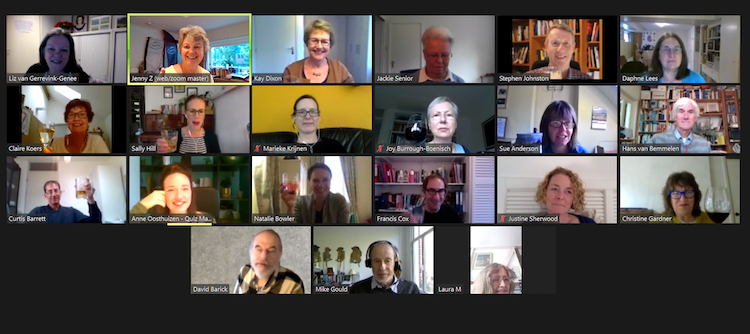
Gin o’clock came early on 25 September. I may have been a little nervous about participating in the SENSE Virtual Quiz night – my first ever event at SENSE ¬– but with a G&T in hand and faced with a very friendly gaggle of language professionals, it was all good.
I soon found myself in a break-out room/team with Mike Gould and Curtis Barrett, feeling utterly useless for the first round: ‘SENSE History’. Fortunately, Mike and Curtis saved the day. The second round, ‘Odd Englishes’, was starting to look more like a joint effort. My favourite new word is whoopensocker – I’ve been trying to sneak it into a sentence at every opportunity this week.
SIG and Social Events Coordinator Anne Oosthuizen’s initial plan to go five rounds proved too ambitious with this slightly unruly bunch of 24 contestants, and so we voted to decide the topic for the last round. ‘Literature’ won overwhelmingly, and at long last, I started to feel somewhat useful. This is a good thing when you’re a little on the competitive side. That person who wants to ‘win’ so badly that she ends up with the wrong contact lens prescription because she hazards guesses as the letters on the chart keep getting smaller? Yep, that’s me. Imagine my joy when I realized I might make myself useful in this round. Never mind that it was a stroke of pure luck that I had read some of these books – and that my rapidly deteriorating memory decided not to forsake me for once.
The quiz was beautifully put together, organized and moderated. Webmaster Jenny Zonneveld dealt with all the tech stuff and quickly checked the answers and totted up the numbers. Anne, who put together the very clever questions, joined the side rooms from time to time, graciously trying her best to keep a straight face while we flailed around in our, at times, desperate attempts to find the correct answers – or any answers for that matter.
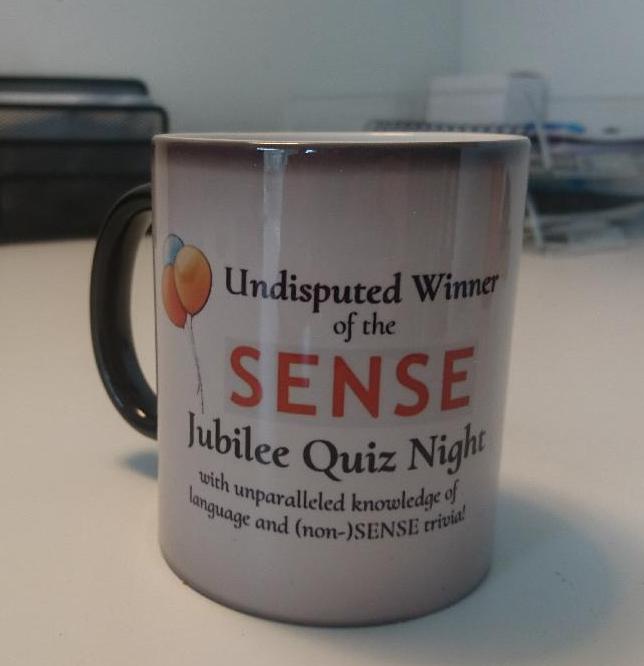
From all of us, a massive thank you to Anne and Jenny for organizing this fabulous start to the weekend!